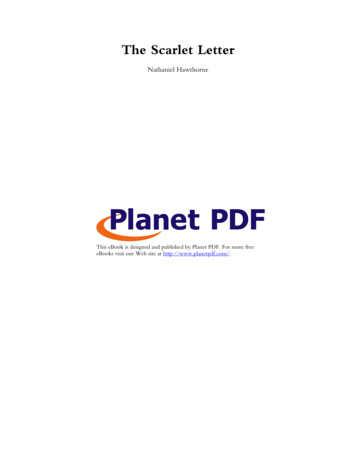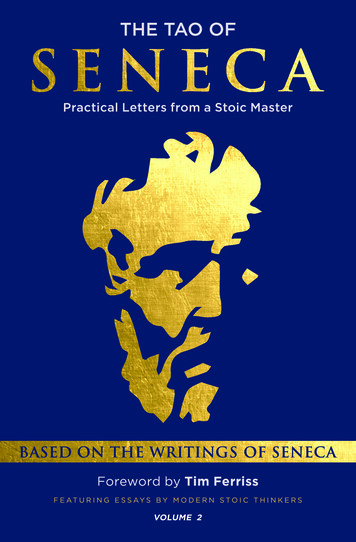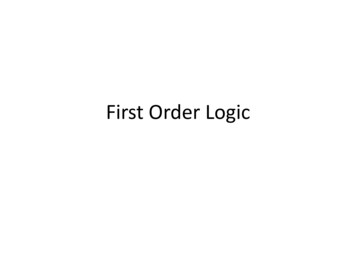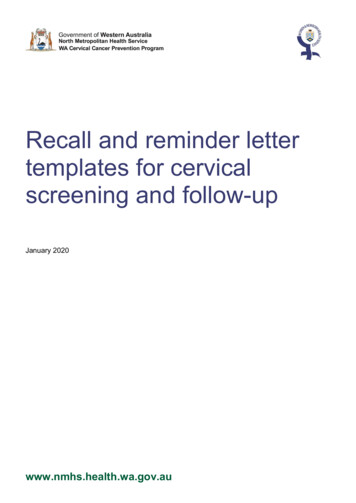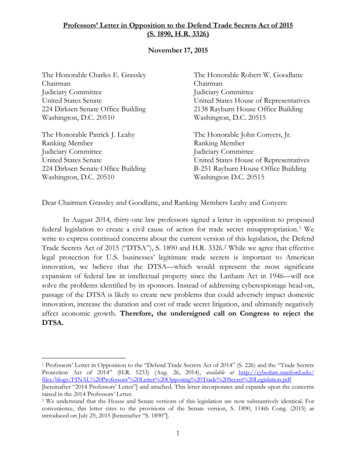
Transcription
Professors’ Letter in Opposition to the Defend Trade Secrets Act of 2015(S. 1890, H.R. 3326)November 17, 2015The Honorable Charles E. GrassleyChairmanJudiciary CommitteeUnited States Senate224 Dirksen Senate Office BuildingWashington, D.C. 20510The Honorable Robert W. GoodlatteChairmanJudiciary CommitteeUnited States House of Representatives2138 Rayburn House Office BuildingWashington, D.C. 20515The Honorable Patrick J. LeahyRanking MemberJudiciary CommitteeUnited States Senate224 Dirksen Senate Office BuildingWashington, D.C. 20510The Honorable John Conyers, Jr.Ranking MemberJudiciary CommitteeUnited States House of RepresentativesB-251 Rayburn House Office BuildingWashington D.C. 20515Dear Chairmen Grassley and Goodlatte, and Ranking Members Leahy and Conyers:In August 2014, thirty-one law professors signed a letter in opposition to proposedfederal legislation to create a civil cause of action for trade secret misappropriation. 1 Wewrite to express continued concerns about the current version of this legislation, the DefendTrade Secrets Act of 2015 (“DTSA”), S. 1890 and H.R. 3326.2 While we agree that effectivelegal protection for U.S. businesses’ legitimate trade secrets is important to Americaninnovation, we believe that the DTSA—which would represent the most significantexpansion of federal law in intellectual property since the Lanham Act in 1946—will notsolve the problems identified by its sponsors. Instead of addressing cyberespionage head-on,passage of the DTSA is likely to create new problems that could adversely impact domesticinnovation, increase the duration and cost of trade secret litigation, and ultimately negativelyaffect economic growth. Therefore, the undersigned call on Congress to reject theDTSA.Professors’ Letter in Opposition to the “Defend Trade Secrets Act of 2014” (S. 226) and the “Trade SecretsProtection Act of 2014” (H.R. 5233) (Aug. 26, 2014), available at Legislation.pdf[hereinafter “2014 Professors’ Letter”] and attached. This letter incorporates and expands upon the concernsraised in the 2014 Professors’ Letter.2 We understand that the House and Senate versions of this legislation are now substantively identical. Forconvenience, this letter cites to the provisions of the Senate version, S. 1890, 114th Cong. (2015) asintroduced on July 29, 2015 [hereinafter “S. 1890”].11
Professors’ Letter in Opposition to the Defend Trade Secrets Act of 2015(S. 1890, H.R. 3326)Summary of ArgumentsIn recent years, numerous concerns about a federal civil cause of action for tradesecret misappropriation have been detailed in analyses prepared by experts in the field oftrade secret and intellectual property law.3 Fundamentally, these experts oppose thelegislation because: (1) it will not address the cyberespionage problem that is most often usedto justify the adoption of a federal trade secret law; (2) a federal trade secret law is notneeded to protect U.S. trade secrets because there is already a robust set of state laws for theprotection of such secrets; and (3) there are significant costs to creating a federal civil causeof action for trade secret misappropriation. In addition to these concerns, this letter detailsthe following four specific reasons why the undersigned urge rejection of the 2015 DefendTrade Secrets Act.1. The DTSA’s Ex Parte Seizure Provision May Harm Small Businesses,Startups and Other Innovators2. The DTSA Appears to Implicitly Recognize The Inevitable DisclosureDoctrine3. The DTSA Likely Will Increase the Length and Cost of Trade SecretLitigation4. The DTSA Will Likely Result in Less Uniformity in Trade Secret LawWe also urge Congress to hold hearings that focus on the costs of the legislationand whether the DTSA addresses the cyberespionage problem that it is allegedly designed tocombat. Specifically, Congress should evaluate the DTSA through the lens of employees,small businesses, and startup companies that are most likely to be adversely affected bythe legislation.Contrary to the assertion that there is no opposition to the DTSA, a number of scholars and commentatorshave raised concerns about the DTSA’s scope, efficacy and impact. See Eric Goldman, Federal Trade Secret htm (Aug. 4, 2015); David S. Levine & Sharon K. Sandeen, Open Letter to theSponsors of the Revised Defend Trade Secrets Act, ter-sponsorsrevised-defend-trade-secrets-act (Aug. 3, 2015); John Tanski, The Defend Trade Secrets Act is Strong Medicine. Is ItToo Strong?, Nat’l L.J., Oct. 30, 2015, too-strong/?slreturn 20150931104239. Additional recent scholarshipcritical of proposals to create a federal civil cause of action for trade secret misappropriation include: ZoeArgento, Killing the Golden Goose: The Dangers of Strengthening Domestic Trade Secret Rights In Response to CyberMisappropriation, 16 Yale J.L. & Tech. 172 (2014); David S. Levine & Sharon K. Sandeen, Here Come the TradeSecret Trolls, 71 Wash. & Lee L. Rev. Online 230 (2015); Christopher B. Seaman, The Case Against FederalizingTrade Secrecy, 101 Va. L. Rev. 317 (2015).32
Professors’ Letter in Opposition to the Defend Trade Secrets Act of 2015(S. 1890, H.R. 3326)Detailed Arguments1. The DTSA’s Ex Parte Seizure Provision May Harm Small Businesses,Startups and Other InnovatorsLike its predecessor bills, the current version of the DTSA contains a controversialprovision authorizing a trade secret owner to obtain, on an ex parte basis, a court order toseize property that contains alleged trade secret information under certain circumstances. 4Although this provision is more limited in scope than prior proposals,5 it still containssignificant potential to cause anti-competitive harm, particularly against U.S.-based smallbusinesses, startups and other entrepreneurs. Moreover, proponents of the DTSA haveargued that such a provision will not be frequently utilized, which raises the question: Whycreate a new remedy that is fraught with potential for abuse?First, the DTSA’s ex parte seizure provision is impermissibly vague. It is unclear fromthe statutory text what “property” may be seized “to prevent the propagation ordissemination” of the alleged trade secret. For example, if the alleged trade secret iscomputer source code, could the court order the seizure of all computer servers (and otherelectronic storage media, like flash drives) under the defendants’ control that contains a copyof the code? Even with the requirement that the ex parte seizure order must “provide for thenarrowest seizure of property necessary to achieve [these] purposes,”6 it may still result insignificant harm to the alleged misappropriator’s legitimate business operations.7Second, the ex parte nature of the process for obtaining a seizure order means that analleged misappropriator will be unable to immediately and meaningfully challenge theplaintiff’s assertions regarding the alleged trade secret status of the information and theclaimed misappropriation. As one commentator recently explained, “so much businessinformation can potentially qualify as a trade secret that it is easy for unscrupulous plaintiffsS. § 1890, § 2 (proposed for codification at 18 U.S.C. § 1836(b)(2)). For a more detailed critique of theinfirmities of the ex parte seizure provision, see Eric Goldman, Ex Parte Seizures and the Defend Trade Secrets Act,72 Wash. &. Lee L. Rev. Online (forthcoming Nov. 2015).5 Among other changes, the current version of the ex parte seizure provision would limit the scope of a seizureorder to “property necessary to prevent the propagation or dissemination of the trade secret that is thesubject of the action,” id. (proposed for codification at 18 U.S.C. § 1836(b)(2)(A)(i)); it would add additionaldetails regarding the required court hearing within seven days after the ex parte seizure is granted, id.(proposed for codification at 18 U.S.C. § 1836(b)(2)(F)); and it would require that the court take possession ofthe seized materials, id. (proposed for codification at 18 U.S.C. § 1836(b)(2)(D)). Like last year’s DTSA, it alsoincludes a provision allowing for an action for damages in the case of wrongful seizure. Id. (proposed forcodification at 18 U.S.C. § 1836(b)(2)(G)).6 Id. (proposed for codification at 18 U.S.C. § 1836(b)(2)(B)(ii)).7 Cf. Steve Jackson Games, Inc. v. U.S. Secret Service, 816 F. Supp. 432 (W.D. Tex. 1993), aff’d on other grounds,36 F.3d 457 (5th Cir. 1994) (seizure of computer server allegedly containing an item of stolen informationcaused significant collateral damage that permanently undermined the company’s business).43
Professors’ Letter in Opposition to the Defend Trade Secrets Act of 2015(S. 1890, H.R. 3326)to manufacture trade secret claims and use them as strategic weapons.” 8 Self-interestedadvocates seeking an ex parte seizure order are unlikely to point out potential weaknessesand/or complexities in their own case, such as the likelihood of reverse engineering andprevious disclosures that may undermine the claim of secrecy. Indeed, because the defendantis absent from the courtroom, the court will lack knowledge of any relevant facts that wouldweigh against granting a seizure. As a result, the DTSA’s ex parte seizure provision isparticularly pro-plaintiff.Critically, because opposing an ex parte seizure order “is likely to be an extremelyexpensive process for both the courts and the parties, start-up companies that are sued bylarger companies might very well capitulate rather than incur the expense” of challenging theplaintiff’s claims.9 As a result, “[t]he chilling effect on innovation and job growth . . . couldbe profound.”10 Especially as the DTSA fails to meaningfully address the cyberespionageproblem repeatedly cited by its proponents, this reason alone suggests it should be rejected.112. The DTSA Appears to Implicitly Recognize The Inevitable DisclosureDoctrineThe current version of the DTSA also contains new language regarding injunctiverelief that appears to implicitly recognize the so-called inevitable disclosure doctrine. Ifaccurate, this would represent a profound shift in both the law governing the enforceabilityof non-compete agreements and trade secrets, particularly in jurisdictions that do notcurrently recognize the doctrine.Under the inevitable disclosure doctrine, “a plaintiff may prove a claim of trade secretmisappropriation by demonstrating that defendant’s new employment will inevitably leadhim to rely on the plaintiff’s trade secrets.”12 “Inevitable disclosure is not a separate cause ofaction; rather, it is a means of proving misappropriation or irreparable harm for injunctiverelief.”13 In states that recognize inevitable disclosure, the typical remedy is to enjoin theTanski, supra note 3.Levine & Sandeen, Open Letter to the Sponsors of the Revised Defend Trade Secrets Act, supra note 3, at 2.10 Levine & Sandeen, Here Come the Trade Secret Trolls, supra note 3, at 255; see also Tanski, supra note 3(explaining that “[t]he DTSA’s seizure provision—which effectively allows the plaintiff to petition the court,in secret, to shut down the defendant’s business for up to a week—creates significant business risk”).Importantly, other avenues for preliminary relief would still remain open to trade secret holders, includingtemporary restraining orders (TROs), preliminary injunctions, takedown notices under the Digital MillenniumCopyright Act, and ex parte seizures under the Lanham Act.11For further discussion of the DTSA’s negative impact on cybersecurity and its failure to addresscyberespionage, see David S. Levine, School Boy’s Tricks: Reasonable Cybersecurity and the Panic of Law Creation, 72Wash & Lee L. Rev. Online (forthcoming 2015).12 PepsiCo, Inc. v. Redmond, 54 F.3d 1262, 1269 (7th Cir. 1995).13 Seaman, supra note 3, at 366.894
Professors’ Letter in Opposition to the Defend Trade Secrets Act of 2015(S. 1890, H.R. 3326)departing employee from commencing employment until the subject trade secretinformation is no longer a trade secret. As Professor Elizabeth Rowe has explained, “[t]heinevitable disclosure doctrine is controversial primarily because . . . at its core, it appears togo against a fundamental tenet of employment law: the at-will doctrine.”14The current version of the DTSA contains language that could reasonably beinterpreted to endorse the inevitable disclosure doctrine as a matter of federal law. TheDTSA provides that a court may grant an injunction “to prevent any actual or threatenedmisappropriation . . . on such terms as the court deems reasonable, provided the order does notprevent a person from accepting an offer of employment under conditions that avoid actual or threatenedmisappropriation.”15 The italicized language implies that if there are no conditions that wouldeffectively prevent a departing employee from engaging in “actual or threatenedmisappropriation” once he or she has started working for a new employer, then the districtcourt may grant an injunction prohibiting the employee from accepting the new position.Federal recognition of the inevitable disclosure doctrine would be troubling because“a rising number of empirical studies . . . suggest that lesser constraints on employeemobility may increase economic growth and innovation.”16 It would also contradict the longstanding public policy of jurisdictions like California that reject the inevitable disclosuredoctrine as a matter of state law, and that have benefitted greatly from employee mobility.17In such jurisdictions, trade secret holders seeking an injunction against departing employeeswould simply invoke federal law, thus effectively rendering the state law inoperative. In sum,the risk that putative trade secret holders—particularly incumbent firms—could preventindividuals from being able to feed their families through this controversial doctrine, andalso misuse this provision against small businesses and startups, counsel rejection of theDTSA.3. The DTSA Likely Will Increase the Length and Cost of Trade SecretLitigationIn addition, the DTSA likely will increase the length and cost of trade secret litigation,thus further exacerbating the DTSA’s negative impact on small businesses and startups.Specifically, the DTSA would grant federal courts original (but not exclusive) jurisdictionElizabeth A. Rowe, When Trade Secrets Become Shackles: Fairness and the Inevitable Disclosure Doctrine, 7 Tul. J.Tech. & Intell. Prop. 167, 183 (2005).15 S. 1890, § 2 (proposed for codification at 18 U.S.C. § 1836(b)(3)) (emphasis added).16 On Amir & Orly Lobel, Driving Performance: A Growth Theory of Noncompete Law, 16 Stan. Tech. L. Rev. 833,837-38 (2013).17 See Whyte v. Schlage Lock Co., 125 Cal. Rptr. 2d 277, 291-94 (Ct. App. 2002) (rejecting inevitabledisclosure under California law).145
Professors’ Letter in Opposition to the Defend Trade Secrets Act of 2015(S. 1890, H.R. 3326)over civil trade secret claims.18 To establish federal jurisdiction, a trade secret plaintiff suingunder the DTSA would have to show that the alleged trade secret is “related to a product orservice used in, or intended for use in, interstate or foreign commerce.”19 Although thisprovision is apparently broad in scope, “it obviously does not (and cannot) describe all U.S.trade secret information, as not all trade secrets are necessarily ‘related to a product orservice . . . used in . . . commerce,’ like many customers lists.”20 At a minimum, the tradesecret plaintiff would have to demonstrate to the court’s satisfaction, likely early in the case,that the alleged trade secrets satisfy this jurisdictional requirement which is demanded by theCommerce Clause of the U.S. Constitution. This would both delay the case and result inincreased costs in litigating the issue.Another reason that the DTSA may increase the cost of trade secret litigation is thebroad scope of discovery permitted under the Federal Rules of Civil Procedure. Discovery intrade secret litigation is already very expensive; a recent survey of IP lawyers found thatmedian litigation costs through the end of discovery ranged from 250,000 in cases whereless than 1 million was at stake, to over 1.6 million in cases where over 25 million was atrisk.21 The stringent pleading requirements and liberal discovery standards of federal courts,and electronic discovery, may exacerbate this problem. These cost concerns also call for theDTSA’s abandonment.4. The DTSA Will Likely Result in Less Uniformity in Trade Secret LawLastly, DTSA’s sponsors contend that its adoption would “[h]armonize U.S. law” and“create a uniform standard for trade secret misappropriation.”22 Yet, in reality, the law wouldbe adopted against the backdrop of the non-existence of any federal jurisprudence regardinga civil trade secret claim.23 Moreover, a careful examination of the bill’s provisions, revealthat the DTSA would in fact result in less uniformity in trade secrets law than currently exists.S. 1890, § 2 (proposed for codification at 18 U.S.C. § 1836(c)). For a fuller discussion of these issues, seeSharon K. Sandeen, DTSA: The Litigator's Full-Employment Act, 72 Wash & Lee L. Rev. Online (forthcoming2015).19 Id. (proposed for codification in 18 U.S.C. § 1836(b)(1)).20 2014 Professors’ Letter, supra note 1, at 3.21 Am. Intellectual Prop. Law Ass’n, Report of the Economic Survey 2015, at 39, I-166, I-169 (2015).22 Press Release, Senate, House Leaders Introduce Bipartisan, Bicameral Bill to Protect Trade Secrets (July 29, icameral-bill-to-protect-trade-secrets; see also Letter from Association of Global Automakers, Inc. et al., tothe Honorable Orrin Hatch et al. (July 29, 2015), available at http://www.hatch.senate.gov/public/ TSA%20Senate%20Support%20Letter.pdf(“The Defend Trade Secrets Act will create a harmonized, uniform standard and system for companies toprotect their trade secrets.”).23 See Sharon K. Sandeen, The Evolution of Trade Secret Law: Why Courts Commit Error When They Do Not Followthe UTSA, 33 Hamline L. Rev. 493(2010) (explaining that in the 1960s there were several proposals to adopt a186
Professors’ Letter in Opposition to the Defend Trade Secrets Act of 2015(S. 1890, H.R. 3326)As explained in the 2014 Professors’ Letter, “[t]here is already a robust and uniformbody of state law governing the protection of trade secrets in the United States.” 24 TheUniform Trade Secrets Act (“UTSA”) has been adopted by 47 of 50 states, 25 and many U.S.businesses have successfully used the UTSA for decades to combat trade secretmisappropriation. Indeed, even advocates of a federal civil cause of action for trade secretmisappropriation acknowledge that the UTSA helped create a “coherent and consistent bodyof trade secrets law”26 that has resulted in “greater consistency in the application of tradesecret law and in the laws themselves.”27 As a result, this well-established, substantiallyuniform body of law has a high level of predictability for U.S. businesses and their attorneys.The DTSA would undermine this high degree of uniformity by creating newdifferences with existing state law and by requiring the development of a new body offederal jurisprudence. For example, the vast majority of states have adopted a three-yearstatute of limitations for aggrieved businesses and individuals to bring trade secret claims. 28The DTSA has a five-year statute of limitations.29 The DTSA would also accept, withoutchange, the existing Economic Espionage Act’s (“EEA”) definition of a trade secret, whichis broader in several respects than the UTSA.30 Also, as previously mentioned, the DTSAappears to endorse a new barrier to mobility of labor by recognizing the so-called inevitablefederal trade secret law but also concerns about the absence of federal jurisprudence on the subject, therebyleading to the drafting of the UTSA instead).24 2014 Professors’ Letter, supra note 1, at 2; see also TianRui Group Co. v. Int’l Trade Comm’n, 661 F.3d1322, 1327 (Fed. Cir. 2011) (“[T]rade secret law varies little from state to state and is generally governed bywidely recognized authorities such as . . . the Uniform Trade Secrets Act.”).25 See Seaman, supra note 3, at 391-92 (detailing each state’s adoption of the UTSA). New York generallyfollows the Restatement (Third) of Unfair Competition, which is largely based upon the UTSA. See Wiener v. LazardFreres & Co., 241 A.D.2d 114, 124, 672 N.Y.S.2d 8, 15 (1st Dep’t 1998) (applying Restatement (Third) of UnfairCompetition to define a trade secret in New York). Massachusetts trade secret law is based in small part onstatutory law and in large part on common law that is consistent with what is expressed in the Restatement(Third) of Unfair Competition. See Mass. Gen. Laws Ann. ch. 93, §§ 42 to 42A and Mass. Gen. Laws Ann. ch.266, § 30(4). North Carolina has adopted a statute that codifies many of the key principles UTSA. See N.C.Gen. Stat. § 66-152 et seq. (2014).26 R. Mark Halligan, Protection of U.S. Trade Secret Assets: Critical Amendments to the Economic Espionage Act of 1996,7 J. Marshall Rev. Intell. Prop. L. 656, 670 (2008).27 David S. Almeling, Seven Reasons Why Trade Secrets Are Increasingly Important, 27 Berkeley Tech. L.J. 1091, 1106(2012).28 Seaman, supra note 3, at 393-94.29 S. 1890, § 2 (proposed for codification at 18 U.S.C. § 1836(d)).30 Seaman, supra note 3, at 361-62. For discussion of the broad trade secret definition under the EEA, seeRochelle Dreyfuss and Orly Lobel, Economic Espionage as Reality or Rhetoric: Equating Trade Secrecy with NationalSecurity (on file with authors).7
Professors’ Letter in Opposition to the Defend Trade Secrets Act of 2015(S. 1890, H.R. 3326)disclosure doctrine, even though a number of UTSA jurisdictions have expressly rejectedthis ill-conceived doctrine.31Most significantly, the DTSA expressly declines to preempt existing law regardingtrade secrets because the jurisdictional requirement could not possibly cover all trade secretclaims.32 This will permit a federal civil cause of action for trade secret misappropriation toexist in parallel with state law, possibly in the same lawsuit. Thus, in a trade secret dispute,the trade secret holder would seek to invoke whichever law—federal or state—appears mostfavorable under the circumstances. This would encourage forum-shopping and cause choiceof-law problems that are widely recognized as undesirable, and would not advance the fightagainst cyberespionage. This further underscores that the DTSA should be rejected.***For these reasons, the undersigned law professors urge Congress to reject theDTSA. In addition, as requested in the 2014 Professors’ Letter,33 we call for yourCommittees to schedule full hearings so that the informed opinions of all sides—bothproponents and opponents—can be fully discussed and challenged in an open forum.Importantly, hearings should not be limited simply to denouncing cyberespionage againstU.S. companies, which we agree is a problem. Rather, the hearings should focus on thecosts of the legislation, as well as whether the DTSA addresses the cyberespionageproblem that it is allegedly designed to combat. In particular, we call for Congress toevaluate the DTSA through the lens of employees, small businesses, and startupcompanies that are most likely to be adversely affected by the legislation.You may address any reply or correspondence to its authors and organizers,Professor Eric Goldman (egoldman@gmail.com), Professor David S. Levine(dsl2@princeton.edu), Professor Sharon K. Sandeen (ssandeen@hamline.edu), andProfessor Christopher B. Seaman (seamanc@wlu.edu).See, e.g., Whyte v. Schlage Lock Co., 125 Cal. Rptr. 2d 277 (Ct. App. 2002); LeJeune v. Coin Acceptors, Inc.,849 A.2d 451 (Md. 2004). For further discussion of labor mobility issues in the technology sector, seeAnnaLee Saxenian, Regional Advantage: Culture and Competition in Silicon Valley and Route 128 (Cambridge, MA:Harvard University Press),1994).32 See S. 1890, § 2 (proposed for codification at 18 U.S.C. § 1839(f)) (“Nothing in the amendments made bythis section shall be construed to . . . preempt any other provision of law.”).33 2014 Professors’ Letters, supra note 1, at 7.318
Professors’ Letter in Opposition to the Defend Trade Secrets Act of 2015(S. 1890, H.R. 3326)Respectfully submitted,*Eric GoldmanProfessor of LawSanta Clara University School of LawDavid S. LevineAssociate Professor of LawElon University School of LawVisiting Research Collaborator, Princeton Center for Information TechnologyPolicyAffiliate Scholar, Stanford Law School Center for Internet and SocietySharon K. SandeenProfessor of LawHamline University School of LawChristopher B. SeamanAssociate Professor of LawWashington and Lee University School of LawJane BambauerAssociate Professor of LawUniversity of Arizona, James E. Rogers College of LawJim BessenLecturer in LawBoston University School of LawMario BiagioliDistinguished Professor of Law and Science and Technology StudiesDirector, Center for Science and Innovation StudiesUniversity of California, DavisBarbara B. BresslerAssociate Professor of LawDirector Emeritus, Center for Intellectual Property Law and InformationTechnologyDePaul University College of LawAll institutions are listed for identification purposes only. The signatories speak only for themselves, andnot for or on behalf of their respective institutions or for any other entity.*9
Professors’ Letter in Opposition to the Defend Trade Secrets Act of 2015(S. 1890, H.R. 3326)Irene CalboliProfessor of LawTexas A&M University School of LawMichael A. CarrierDistinguished Professor of LawRutgers Law SchoolRochelle DreyfussPauline Newman Professor of LawNew York University School of LawEric FinkAssociate Professor of LawElon University School of LawCatherine FiskChancellor’s Professor of LawCo-Director, Center in Law, Society and CultureUniversity of California, Irvine School of LawWilliam GallagherProfessor of LawCo-Director, IP Law CenterGolden Gate University School of LawElizabeth Townsend GardJill. H and Avram A. Glazer Professor in Social EntrepreneurshipCo-Director, Tulane Center for IP, Media & CultureTulane University Law SchoolShubha GhoshVilas Research Fellow & George Young Bascom Professor in Business LawUniversity of Wisconsin Law SchoolMegan GrayNon-Residential FellowStanford Law School Center for Internet and SocietyCamilla A. HrdyFellowCenter for Technology, Innovation & CompetitionUniversity of Pennsylvania Law School10
Professors’ Letter in Opposition to the Defend Trade Secrets Act of 2015(S. 1890, H.R. 3326)Eric E. JohnsonAssociate Professor of LawUniversity of North Dakota School of LawFaye E. JonesDirector of the Library and Clinical Professor of LawUniversity of Illinois College of LawMargot KaminskiAssistant Professor of LawThe Ohio State University, Moritz College of LawYvette LiebesmanAssociate ProfessorSaint Louis University School of LawPatrick LinAssociate ProfessorCal Poly San Luis ObispoAffiliate Scholar, Stanford Law School Center for Internet and SocietyOrly LobelDon Weckstein Professor of Employment and Labor LawFaculty Member, Center for Intellectual Property & MarketsUniversity of San DiegoLydia LorenRobert E. Jones Professor of Advocacy and EthicsLewis & Clark Law SchoolBrian J. LoveAssistant ProfessorCo-Director of the High Tech Law InstituteSanta Clara University School of LawWilliam MonerInstructorElon University School of CommunicationsDeirdre MulliganAssociate Professor, School of InformationFaculty Director, Berkeley Center for Law and TechnologyUniversity of California, Berkeley11
Professors’ Letter in Opposition to the Defend Trade Secrets Act of 2015(S. 1890, H.R. 3326)Ira Steven NathensonProfessor of LawSt. Thomas University School of LawBrian NienhausAssociate Professor of Business CommunicationElon University School of BusinessTyler T. OchoaProfessor of LawSanta Clara University School of LawDavid OlsonAssociate Professor of LawBoston College Law SchoolKenneth L. PortProfessor of LawWilliam Mitchell College of LawDavid G. PostProfessor of Law (ret.)Temple University, Beasley School of LawMichael RischProfessor of LawVillanova University School of LawSimone RoseProfessor of LawWake Forest University School of LawPam SamuelsonRichard M. Sherman Distinguished Professor of LawProfessor of School of InformationCo-Director, Berkeley Center for Law & TechnologyUniversity of California, BerkeleyJoshua SarnoffProfessor of LawDePaul University College of Law12
Professors’ Letter in Opposition to the Defend Trade Secrets Act of 2015(S. 1890, H.R. 3326)Kurt SaundersProfessor of Business LawCalifornia State University NorthridgeKatherine J. StrandburgAlfred B. Engelberg Professor of LawNew York University School of LawRebecca TushnetProfessor of LawGeorgetown University School of LawSally K. WiantProfessor of LawWashington and Lee University School of Law13
August 26, 2014Professors’ Letter Opposing Trade Secret LegislationProfessors’ Letter in Opposition to the“Defend Trade Secrets Act of 2014” (S. 2267) and the“Trade Secrets Protection Act of 2014” (H.R. 5233)August 26, 2014To the sponsors of the above-referenced legislation and other Members of the UnitedStates Congress:The undersigned are 31 professors from throughout the United States who teachand write extensively about intellectual property law, trade secret law, innovationpolicy and/or information law.1 We urge Congress to reject the proposed legislation tocreate a new private cause of action un
Professors' Letter in Opposition to the Defend Trade Secrets Act of 2015 (S. 1890, H.R. 3326) 3 Detailed Arguments 1. The DTSA's Ex Parte Seizure Provision May Harm Small Businesses, Startups and Other Innovators Like its predecessor bills, the current version of the DTSA contains a controversial
